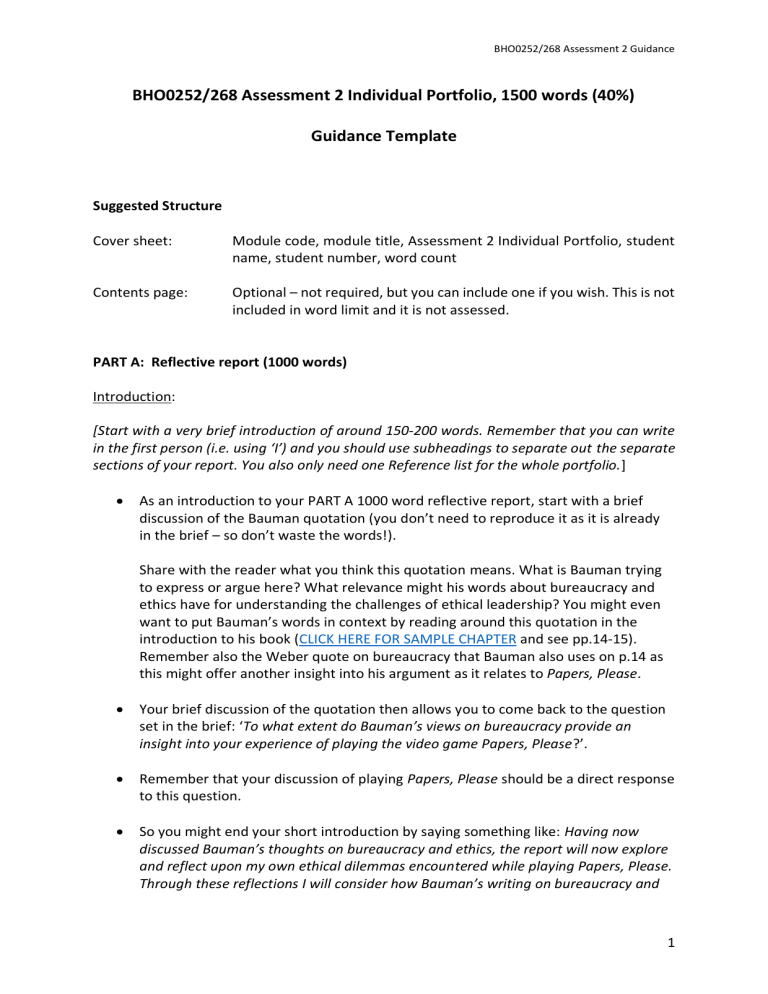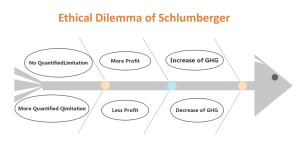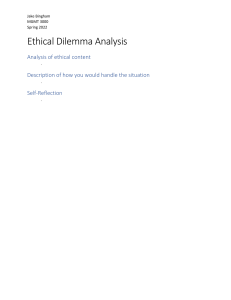
BHO0252/268 Assessment 2 Guidance BHO0252/268 Assessment 2 Individual Portfolio, 1500 words (40%) Guidance Template Suggested Structure Cover sheet: Module code, module title, Assessment 2 Individual Portfolio, student name, student number, word count Contents page: Optional – not required, but you can include one if you wish. This is not included in word limit and it is not assessed. PART A: Reflective report (1000 words) Introduction: [Start with a very brief introduction of around 150-200 words. Remember that you can write in the first person (i.e. using ‘I’) and you should use subheadings to separate out the separate sections of your report. You also only need one Reference list for the whole portfolio.] • As an introduction to your PART A 1000 word reflective report, start with a brief discussion of the Bauman quotation (you don’t need to reproduce it as it is already in the brief – so don’t waste the words!). Share with the reader what you think this quotation means. What is Bauman trying to express or argue here? What relevance might his words about bureaucracy and ethics have for understanding the challenges of ethical leadership? You might even want to put Bauman’s words in context by reading around this quotation in the introduction to his book (CLICK HERE FOR SAMPLE CHAPTER and see pp.14-15). Remember also the Weber quote on bureaucracy that Bauman also uses on p.14 as this might offer another insight into his argument as it relates to Papers, Please. • Your brief discussion of the quotation then allows you to come back to the question set in the brief: ‘To what extent do Bauman’s views on bureaucracy provide an insight into your experience of playing the video game Papers, Please?’. • Remember that your discussion of playing Papers, Please should be a direct response to this question. • So you might end your short introduction by saying something like: Having now discussed Bauman’s thoughts on bureaucracy and ethics, the report will now explore and reflect upon my own ethical dilemmas encountered while playing Papers, Please. Through these reflections I will consider how Bauman’s writing on bureaucracy and 1 BHO0252/268 Assessment 2 Guidance ethics speak to my own experience and the implications this might have for understanding the challenges of ethical leadership. • This short introduction then sets the scene for the rest of your reflective report. [Suggested subheading]: Ethical Analysis of Papers, Please You now need to describe and analyse your experiences playing Papers, Please. However, you need to decide on your strategy for this part of your reflective report. There are three options for how you might do this: 1. You might want to have three subheadings for three sections that each address a specific dilemma from the game and relate this to a module theme. For example: Dilemma 1: Detaining Dari Ludum [200-250 words] Step 1: Describe the circumstances surrounding your encounter with Dari Ludum and what ethical dilemma the game presented you with. Explain how you responded, how you felt about your decision, and whether you changed your response on multiple play-throughs of the game. Step 2: What kinds of ethics informed your decision and did your ethics also change on multiple play-throughs? (draw on any of our three ethical perspectives here as your analytical tools). Did you feel that your actions were consistent with your ethical values? What other contextual factors and pressures were also at play here and how did they impact on your ethical decision/action? Step 3: What module themes have we covered that might help you to explore this ethical dilemma in more detail? Here you could draw on any number of module themes - e.g., you could consider: An ethics of care and gender themes, obedience to authority and conformity, pro-social rule breaking etc. Does this encounter with Dari Ludum also speak to any related real-world themes? This could be an organisational/leadership issue, cultural or societal issues, a news story, etc. Briefly expanding your discussion beyond the game to make these real-world connections might provide a useful means of concluding this first dilemma and what you have learned from it. o Dilemma 2 and Dilemma 3: [200-250 words each] Decide on two different dilemmas from the game that offer a different set of ethical responses and themes when compared to your first example. Use the steps as above to work through your discussion of each dilemma. 2 BHO0252/268 Assessment 2 Guidance Think about selecting dilemmas that complement or contrast with each other. So the Dari Ludum example could contrast with moments in the game where you had to consider separating loved ones from one another, or when a new policy was introduced such as the use of body scanners etc. o Concluding thoughts [150-200 words] Try ending PART A with some brief final words on what you have learned from this task and how your ethical experiences and discussion of module themes have assisted you in addressing the question set in the brief: ‘To what extent do Bauman’s views on bureaucracy provide an insight into your experience of playing the video game Papers, Please?’ [Total words: 700-750] 2. Your second option for organising PART A is to use a module theme to frame your discussion of your ethical dilemmas. So you might have a single module theme in which you explore at least three dilemmas from the game that speak to this theme. An example of a module theme: Bureaucratic Pressures and Obedience to Authority [700-800 words] o Here you could explore module themes around the toxic triangle, the Asch and Milgram experiments, rule following vs pro-social rule breaking, the ethical influence of objects, documents, systems, time keeping etc. o The ethical dilemmas you encountered while playing Papers, Please now serve as illustrative examples of this module theme and how they shaped and influenced your capacity to make an ethical decision or take an ethical action. o Decide on how many ethical dilemmas from the game you might use to explore your module theme and what contribution each dilemma makes to your overarching discussion of: ‘Bureaucratic Pressures and Obedience to Authority’. o Here you can return to our three key ethical perspectives to unpack this module theme further using your dilemmas from the game. o For example, you might ask yourself how the need to blindly follow rules in the game influenced your ability to act virtuously and offer an example when this happened. o Did you feel that a specific ethical dilemma you faced required a deontological response, but you were prevented from this by other factors or constraints? Was it easier to just use a utilitarian or egoist approach at specific moments in the game? Did you feel comfortable having to do this? 3 BHO0252/268 Assessment 2 Guidance Does the game offer any opportunities for altruism or an ethics of care? Was it possible to treat others as fully human during the game when a bureaucratic system is ruthlessly monitoring and measuring your performance? Are there any implications for thinking about real-world examples or experiences that relate to this theme and the game? o Conclusion: [100-150 words] You might end PART A with some final words on what you have learned from this task and how your ethical experiences and discussion of a specific module theme has assisted you in addressing the question set in the brief: ‘To what extent do Bauman’s views on bureaucracy provide an insight into your experience of playing the video game Papers, Please?’ 3. Your third option for PART A is to follow the same module theme approach above, but instead of a single module theme you introduce two (or possibly more) module themes. However, there is a risk that too many themes will make it difficult to go into sufficient detail with your ethical dilemmas. So think carefully about this. Example of module theme: o Module theme 1: Panopticism and Surveillance [350-400 words] Discuss this module theme using one or more ethical dilemmas from the game as an illustration/case study. For example, you might explore the ethics of workplace surveillance to increase organisational performance and draw on moments from the game where you experienced the measurement of your working day and/or a system of punishment by issuing you citations for mistakes made. Provide examples where these panoptic pressures influenced your ethical decisions and actions. Was this a positive or negative experience? How do you feel about the ethical decisions you made and actions you took? Did you change your approach on multiple play-throughs? What kind of ethics did you find you had to use to cope with these panoptic demands? What kind of ethics were you prevented from using? What lessons might these in-game experiences have for real-world uses of panopticism and surveillance, and are there any wider implications for engaging in ethical leadership? Module theme 2 [insert theme here] [350-400 words] Follow the same format as above and adjust the word limit accordingly for each section if you include additional themes. Remember that more than two themes will limit the depth of your analysis and the number of ethical dilemmas from the game that you can include. o Conclusion: [100-150 words] You might end PART A with some final words on what you have learned from 4 BHO0252/268 Assessment 2 Guidance this task and how your ethical experiences and discussion of multiple module themes has assisted you in addressing the question set in the brief: ‘To what extent do Bauman’s views on bureaucracy provide an insight into your experience of playing the video game Papers, Please?’ PART B – Letter to your future self (500 words) Write this as an actual letter. Here is a suggested structure/format: Dear [insert your name], I am imagining you [insert number of years] from now. If things went to according to our plan we should now be working as a [insert job, role, position, etc.]. I’m writing this letter as a reminder of what ethical leadership means to us and what we should remember from our module that we took all those years ago. The parts of the module that I thought were most useful were… [insert text on module themes or any takeaways from the module that you thought were useful. Really think about this and what you genuinely found valuable]. However, as interesting as these module themes were, they are only useful if they can be put into practice. So here are many recommendations to you for how to remain an ethical leader… [insert your lessons or recommendations that you would want to pass on to your future self. Choose as many as you like, but be mindful of the 500 word limit] Yours… [Sign off your letter in any way you like!] Tip: When planning your letter, you might want to try the following: • Start by making a list of any module themes that you remember. This could be anything from the ethical perspectives we explored, to the movie case study Arbitrage, it could be something you wrote about for Assessment 1, or it could be the weekly module themes, examples from the lectures, discussions with fellow students, in-class activities, or academic texts that you read. 5 BHO0252/268 Assessment 2 Guidance • Write a short note under each module theme and think about why you remember this theme, what was interesting about it, and why your future self might find it valuable. • Remember that the Assessment brief says that while you should refer to module themes, academic citations are not required here but you are welcome to use the occasional citation if it helps your future self to remember a module theme or a lesson/recommendation that you want to share. However, do use citations sparingly as this is meant to be an informal letter and not a piece of traditional academic writing. If you do use citations, then remember to include these in your Reference list at the end of the portfolio. • To practice your letter writing skills, try selecting one of your module themes/takeaways and then turn it into a lesson or recommendation for your future self by working with one of the following sentence stems: I have learned from this experience that... I feel that I have significantly developed/improved my ability to... [Insert module theme] gave me the opportunity to improve my understanding of ... This knowledge will be essential to me in my professional life, because... This skill could be useful for me in my future role, because... The next time I face this demand/situation/ethical dilemma, I will try to... Use these sentence stems or think of your own. The purpose of these stems is to get you into a reflective writing mindset. So try this out and once you start writing keep going and see what kind of lessons or recommendations you could create from all of your module themes/takeaways. Then select the specific themes you want to include in your letter. There is also a useful resource here produced by the University of Edinburgh on reflective writing skills. This link here takes you to a section on writing a letter to your future self. Use this if it is helpful in thinking about your own letter writing style: https://www.ed.ac.uk/reflection/reflectors-toolkit/self-awareness/writing-letters 6 BHO0252/268 Assessment 2 Guidance Reference List Remember to end your 1500 word Portfolio with a complete list of all sources used in APA 7th formatting. If you wish, you can also cite the video game Papers, Please. This is not a requirement, and you will not be penalised for not citing the game, but if you do wish to cite and reference the video game then you can use the Reference Builder to find out how to do this: https://library.hud.ac.uk/pages/apareferencing/ https://library.hud.ac.uk/pages/referencing-apps/ Optional Appendix Section This section is optional and should appear at the very end of your portfolio and after your References. Here you can include any background information that may be relevant to your portfolio sections (i.e., images, charts, diagrams, news story extracts etc.). This material should only be used to support and supplement the content of your reflective report and/or letter and cannot be used to introduce any new content or new information. 7


